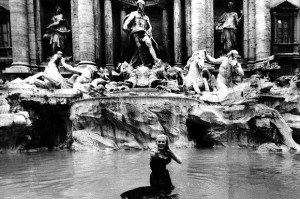Rome stands out as one of film’s greatest sets In Focus by Richard Crouse FOR METRO CANADA January 29, 2010
 According to Italian director Federico Fellini, “Rome is the most wonderful movie set in the world.” A quick IMDB check reveals thousands of movies shot in the ancient city—everything from forgettable fare like The Exorcism of Baby Doll to classics like The Bicycle Thief. The latest movie to use the Eternal City as a backdrop is When in Rome, a new Kristen Bell rom com opening this weekend.
According to Italian director Federico Fellini, “Rome is the most wonderful movie set in the world.” A quick IMDB check reveals thousands of movies shot in the ancient city—everything from forgettable fare like The Exorcism of Baby Doll to classics like The Bicycle Thief. The latest movie to use the Eternal City as a backdrop is When in Rome, a new Kristen Bell rom com opening this weekend.
The most famous Rome scenes in cinema are arguably Gregory Peck teasing Roman Holiday’s Audrey Hepburn by putting his hand in the Mouth of Truth, which purportedly bites off the hands of liars, and La Dolce Vita’s iconic image of Anita Ekberg standing in the Trevi Fountain but for my lira the famous last scene of Fellini’s Roma is the most spectacular.
The sight of a gang of motorcyclists driving through the city, past such landmarks as the Colosseum, the Capitoline Museum and the Forum, is breathtaking. Actress Claudia Ruspoli says it was an eye opener for Italians as well.
“Rome used to be a dark city; the monuments unlit,” she said. “When Fellini shot Roma that summer, the monuments were all lit and we saw them at night for the first time. Beautiful!”
A grittier vision of Rome appears in Roberto Rossellini’s Rome, Open City. Mixing documentary footage of German troops on Rome’s streets with a fictionalized story of Italian resisters on the lam from the Gestapo Rossellini created a new film genre—Italian neo-realism—and by moving the camera outside studio walls, using real locations, available light and nonprofessional actors, provides a real life glimpse of war ravaged Rome.
More polished than Rome, Open City is Vittorio De Sica’s Bicycle Thief. It’s still neorealist, but where Rossellini struggled to cobble together bits of film stock to complete his film, resulting in an uneven look, Bicycle Thief is beautifully photographed. The story of a poor man searching for the person who stole his bike plays like a walking tour of late 1940s Rome.
Since then hundreds of films have shot on the streets of Rome and while the city has been kind to the movies, the movies have also been kind to Rome. Patrizia Prestipino, head of Rome’s provincial department of tourism views any film set in Italy as “free advertising” and notes that the release of movies like Angels and Demons has created a new industry in the country—movie tourism.
